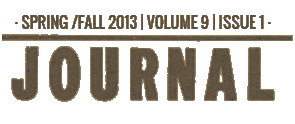· SPRING /FALL 2013 | VOLUME 9 | ISSUE 1 ·
Rougarou, an online literary journal.
Metal and Plum: A Memoir.
By Andrei Guruiana. (Mayapple Press, 2012, 116 pages). ISBN 978-0932412-96-6
In Metal and Plum: A Memoir, Andrei Guruiana speaks for all those nomads and immigrants who courageously and often despairingly leave their homelands in pursuit of their dreams. Guruiana, who left Romania for America in 1991 as a ten year old boy and returned to visit when he was twenty-five, presents us with a personal and evocative memoir in which he invites us to feel what generations of immigrants before him must have confronted, “a culture that welcomes foreigners on its own terms” (8). Guruiana describes how he tackled his elusive American dream, and how by way of perseverance and patience, he built a bridge between the fading memories of his precious Romania and those of his new home in America.
His account is evocative and the reflections of his memories merge together to form a delicately crafted narrative that flits back and forth effortlessly between the poetic and the prose. Sights, smells, sounds, tastes, and touch are spliced together into a near movie-like experience, as Guruiana takes us by the hand and guides us through the ephemeral moments of his Romanian memories: the grey urban and rural landscapes, the smell of the first snow, the cacophony of joy at the Christmas dinner table, the copious amounts of Tuica (Grandfathers home brewed plum flavored firewater) that are consumed to “cut the grease” of the fatty pork dishes, and the feel of his grandmother’s hands “knotted like the gnarled roots of an old walnut tree” (89;90).
The spirit of Guruiana’s immigrant experience is portrayed in intimate metaphor as he recounts one day spent fishing on the Susquehanna River, a day on which it dawns on him that the grass is not always greener on the other side. He has come to fish “just north of the Pennsylvania border in a New York town that reminds him of home, a town that's breathing the last gasp of a one-time miracle,” in which “abandoned factories where people once believed in purpose have left in their wake brown fields, carcasses without a pulse. At times there is little to distinguish this place with its burned out shells from the drab projects where I [Guruiana] was born in Bucharest in 1979.” Also, his efforts to fish for carp on that day serve as a poignant reminder of the daunting task of achieving ones goals in a foreign environment. He writes; “along the bottom, the river is full of fat carp, brown bellies sliding along dirt and clay. Garbage fish, shit eaters that no American will touch. Fish that I take home with me and clean the guts and blood and scales out on the driveway then wash away with buckets of water as clear as sky pulled from the tap” (7).
The book, Guruiana admits, is not a "truthful rendering of history... but instead is an ongoing act of memory,” and it offers a “storyteller's only gift, a series of vignettes, small glimpses into a world you nor I will fully understand but which could help us to know ourselves a little better than before” (5).
He has succeeded in making me know myself better. I can still make him out sitting there on the banks of the Susquehanna River, lingering in the dark, having spent all of the day trying to catch the fat carp at the bottom of the muddy riverbed, but he has caught nothing. Nevertheless, he concludes, “it’s been a good day, I've been patient and I've waited just as Grandfather taught me” (8). Immigrants and non-immigrants alike can learn about patience and perseverance from Guruiana's moving memoir. I really do hope that he eventually lands a really nice big fat carp; and when he does, that he invites me for dinner so that we may share immigrant memories and drink his grandfather’s Romanian Tuica.
DANIEL BEAUDOIN
Tel Aviv University







